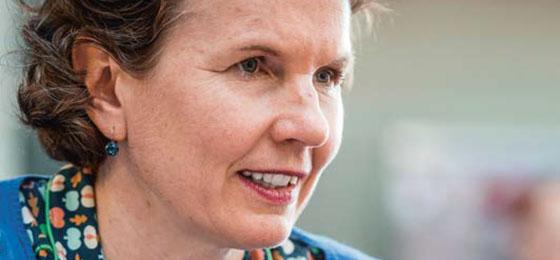"If you don't want to know something, then you don't collect the data"

The commodity industry has grown rapidly in Switzerland. “But we don’t know much about it”, says the lawyer Elisabeth Bürgi Bonanomi. By Marcel Hänggi
(From "Horizons" no. 110 September 2016)
Dr Bürgi, the commodity industry is a hot topic on the Swiss political scene. What do we really know about this sector?
Switzerland is the biggest trading centre for commodities. It's long been known that an abundance of natural resources is often detrimental to developing countries. Their economy can become very one-sided in its focus, they lack processing industries, and post-colonial dependencies remain. These developing countries can only improve their situation if the developed countries where the commodity companies are based also exercise their responsibilities. It's these countries that enable financial outflows and distort the markets in their favour by offering subsidies and erecting tariffs. If you take a closer look at the situation, then you notice that we have no precise knowledge of what's happening. The flow of money is covert, official statistics offer no comprehensive records of trading data, and no one discloses just how much tax the sector pays in Switzerland.
Why is the data situation so poor?
If you don't want to know something, then you simply don't collect the data …
So is a lack of political will the real problem, rather than a lack of scientific knowledge?
Both are lacking. Of course the political will has to be there if you're going to change something. But research as we understand it can make an important contribution. We are consciously trying to pursue a strategy of sustainability and development. But in recent years it's become clear that it's not enough just to conduct our research in developing countries. The question of tax avoidance is absolutely crucial – and here we are still at square one.
How would you describe a healthy commodities sector?
In the extraction countries, those involved should have a voice in deciding what's to be mined, what's to happen with the income from it, and so on. There would be a processing industry on the spot. Human rights and environmental responsibilities would be respected. The companies would pay their taxes in the same countries where value is created, and all participants would have access to a functioning judicial system. There will always be losers, but they shouldn't be the most vulnerable in society.
Marcel Hänggi is a freelance science journalist.
Switzerland and the Commodities Trade. Swiss Academies Factsheets (2016)
Making the Commodity Sector Work for Developing Countries. Swiss Academies Factsheets (2016)
Elisabeth Bürgi Bonanomi
Elisabeth Bürgi Bonanomi is a lawyer who
researches
at the Centre for Development
and Environment (CDE) of the University of
Bern. She is coordinating a literature study
on the commodities trade for CDE, the World
Trade Institute of the University of Bern
and the Institute of Business Ethics at the
University
of St. Gallen.
Politics redoubles its efforts
In recent years, increasing attention has
been paid to the negative consequences of
commodities trading, particularly following the
release of a Berne Declaration report in 2011.
The Swiss Federal
Council later presented a
'Background report on commodities' in 2013.
The imminent revision
of the Stock Corporation
Act is intended to introduce stricter regulations on transparency.
In April 2016, the 'Responsible
Business Initiative' was submitted to
parliament,
thereby also exerting political
pressure for change. For its part, the Swiss
Academies will hold a congress on transparency
in commodities trading on 20 September
2016 in Bern.